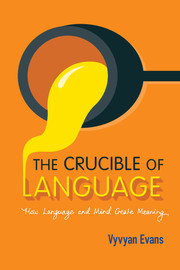Book contents
- Frontmatter
- Dedication
- Epigraph
- Contents
- List of figures
- List of tables
- Preface
- Acknowledgements
- I The ineffability of meaning
- II Meaning in mind
- III Meaning in language
- Chapter 8 Webs of words
- Chapter 9 Meaning in the mix
- Chapter 10 The cooperative species
- Chapter 11 The crucible of language
- Epilogue: The golden triangle
- Notes
- References
- Index
Chapter 10 - The cooperative species
from III - Meaning in language
Published online by Cambridge University Press: 05 November 2015
- Frontmatter
- Dedication
- Epigraph
- Contents
- List of figures
- List of tables
- Preface
- Acknowledgements
- I The ineffability of meaning
- II Meaning in mind
- III Meaning in language
- Chapter 8 Webs of words
- Chapter 9 Meaning in the mix
- Chapter 10 The cooperative species
- Chapter 11 The crucible of language
- Epilogue: The golden triangle
- Notes
- References
- Index
Summary
In the previous chapter, I focused on the relationship between language and the human conceptual system. But this is far from the end of the meaning-making story; there is a large infrastructure that not only supports our meaning-making prowess, but makes it possible in the first place. In this chapter I explore this back office support, which is what enabled our unique capacity for meaning in the first place. In so doing, I will seek to persuade you that language is, in some sense, an evolutionary by-product of more fundamental aspects of our species, and the evolutionary lineage that gave rise to us. It arose not as a means to an end, but as an indirect, albeit inevitable, consequence of what I shall dub our ‘cooperative intelligence’ – the subject of this chapter.
Until relatively recently, the infrastructure that led to the human meaning-making capacity, the result of over two and half million years of biological and cultural evolution, appeared, in the absence of a time-machine, to be too mysterious to be understood. This has changed in recent years, for a number of reasons. For one thing, we now know a lot more than we did even 20 years ago about the cognitive capabilities of great apes. And with that, we know far more about what very early ancestral humans were already equipped with, in terms of their mental capacities. We share many characteristics with other great apes – for instance, around 98 per cent of our DNA, we now know, is shared with chimpanzees. Moreover, advances in paleo-archaeology – the study of the fossil record of hominins, which I'll have more to say about in the final chapter – and advances in carbon and genetic dating, coupled with new computational modelling techniques, now mean that we are in a far better position than previous generations of researchers to say something meaningful about the evolutionary context that gave rise to our unique meaning-making capacity. In this chapter, I will show that our capacity for meaning – the symbiotic binding together of our contemporary conceptual and linguistic systems – is an outcome of a wider pro-social impulse. We are capable of language because we are, inherently and uniquely, the cooperative species.
- Type
- Chapter
- Information
- The Crucible of LanguageHow Language and Mind Create Meaning, pp. 252 - 278Publisher: Cambridge University PressPrint publication year: 2015

